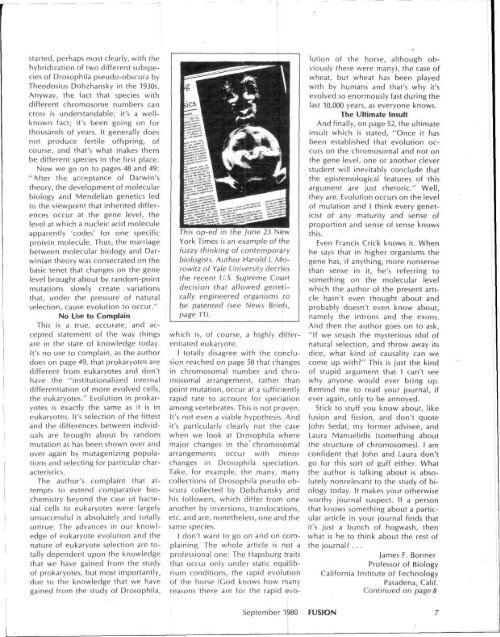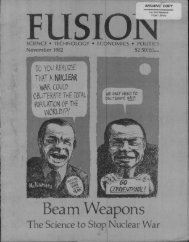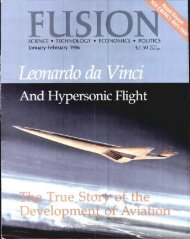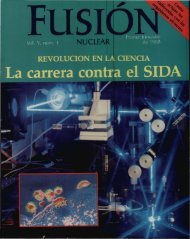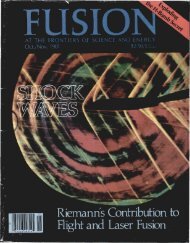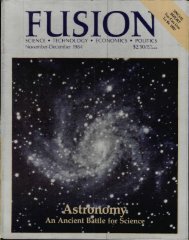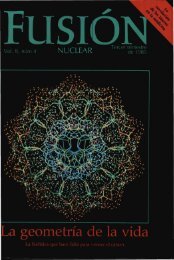fusion energy foundation
fusion energy foundation
fusion energy foundation
- No tags were found...
Create successful ePaper yourself
Turn your PDF publications into a flip-book with our unique Google optimized e-Paper software.
started, perhaps most clearly, with thehybridization of two different subspeciesof Drosophila pseudo-obscura byTheodosius Dobzhansky in the 1930s.Anyway, the fact that species withdifferent chromosome numbers cancross is understandable; it's a wellknownfact; it's been going on forthousands of years. It generally doesnot produce fertile offspring, ofcourse, and that's what makes thembe different species in the first place.Now we go on to pages 48 and 49:"After the acceptance of Darwin'stheory, the development of molecularbiology and Mendelian genetics ledto the viewpoint that inherited differencesoccur at the gene level, thelevel at which a nucleic acid moleculeapparently 'codes' for one specificprotein molecule. Thus, the marriagebetween molecular biology and Darwiniantheory was consecrated on thebasic tenet that changes on the genelevel brought about by random-pointmutations slowly create variationsthat, under the pressure of naturalselection, cause evolution to occur."No Use to ComplainThis is a true, accurate, and acceptedstatement of the way thingsare in the state of knowledge today.It's no use to complain, as the authordoes on page 49, that prokaryotes aredifferent from eukaryotes and don'thave the "institutionalized internaldifferentiation of more evolved cells,the eukaryotes." Evolution in prokaryotesis exactly the same as it is ineukaryotes. It's selection of the fittestand the differences between individualsare brought about by randommutation as has been shown over andover again by mutagenizing populationsand selecting for particular characteristics.The author's complaint that attemptsto extend comparative biochemistrybeyond the case of bacterialcells to eukaryotes were largelyunsuccessful is absolutely and totallyuntrue. The advances in our knowledgeof eukaryote evolution and thenature of eukaryote selection are totallydependent upon the knowledgethat we have gained from the studyof prokaryotes, but most importantly,due to the knowledge that we havegained from the study of Drosophila,This op-ed in the June 21 NewYork Times is an example of thefuzzy thinking of contemporarybiologists. Author Harold I. Morowitzof Yale University decriesthe recent U.S. Supreme Courtdecision that allowed geneticallyengineered organisms tobe patented (see News Briefs,page 11).which is, of course, a highly differentiatedeukaryote.I totally disagree with the conclusionreached on page 50 that changesin chromosomal number and chromosomalarrangement, rather thanpoint mutation, occur at a sufficientlyrapid rate to account for speciationamong vertebrates. This is not proven.It's not even a viable hypothesis. Andit's particularly clearly not the casewhen we look at Drosophila wheremajor changes in the* chromosomalarrangements occur with minorchanges in Drosophila speciation.Take, for example, the many, manycollections of Drosophila pseudo obscuracollected by Dobzhansky andhis followers, which differ from oneanother by inversions, translocations,etc. and are, nonetheless, one and thesame species.I don't want to go on and on complaining.The whole article is not aprofessional one: The Hapsburg traitsthat occur only under static equilibriumconditions, the rapid evolutionof the horse (God knows how manyreasons there are for the rapid evolutionof the horse, although obviouslythere were many), the case ofwheat, but wheat has been playedwith by humans and that's why it'sevolved so enormously fast during thelast 10,000 years, as everyone knows.The Ultimate InsultAnd finally, on page 52, the ultimateinsult which is stated, "Once it hasbeen established that evolution occurson the chromosomal and not onthe gene level, one or another cleverstudent will inevitably conclude thatthe epistemological features of thisargument are just rhetoric." Well,they are. Evolution occurs on the levelof mutation and I think every geneticistof any maturity and sense ofproportion and sense of sense knowsthis.Even Francis Crick knows it. Whenhe says that in higher organisms thegene has, if anything, more nonsensethan sense in it, he's referring tosomething on the molecular levelwhich the author of the present articlehasn't even thought about andprobably doesn't even know about,namely the introns and the exons.And then the author goes on to ask,"If we smash the mysterious idol ofnatural selection, and throw away itsdice, what kind of causality can wecome up with?" This is just the kindof stupid argument that I can't seewhy anyone would ever bring up.Remind me to read your journal, ifever again, only to be annoyed.Stick to stuff you know about, like<strong>fusion</strong> and fission, and don't quoteJohn Sedat, my former advisee, andLaura Manuelidis (something aboutthe structure of chromosomes). I amconfident that John and Laura don'tgo for this sort of guff either. Whatthe author is talking about is absolutelynonrelevant to the study of biologytoday. It makes your otherwiseworthy journal suspect. If a personthat knows something about a particulararticle in your journal finds thatit's just a bunch of hogwash, thenwhat is he to think about the rest ofthe journal?. . .James F. BonnerProfessor of BiologyCalifornia Institute of TechnologyPasadena, Calif.Continued on page 8September 1980 FUSION 7


